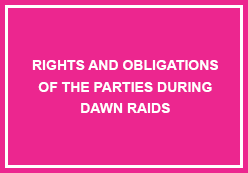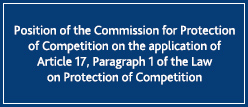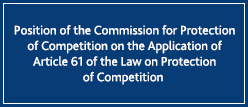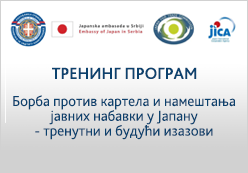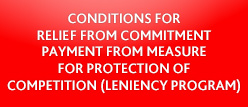On the occassion of adoption of the new Regulation on the content and manner of notification of concentration (”Official Gazette of the RS.”, no. 5/16), Commission for Protection of Competition points to the obligation of market participants to notify concentration.
The Law on Protection of Competition provides for the obligation to notify concentration, in a manner and under conditions prescribed by this Law and the Regulation on the content and manner of notification of concentration (”Official Gazette of the RS.”, no. 89/09). It also established the obligation of the party to concentration to suspend the implementation of concentration until the decision of the Commission, as well as Commission’s competence, in case of implementation of concentration contrary to these obligations, to determine a measure for protection of competition to market participant, in the form of pecuniary fine in the amount up to 10% of the total annual turnover.
Failure to comply with obligations relating to notification of concentration within the legally prescribed period (Article 63), and suspension of concentration until the decision of the Commission, constitute a violation of the Law, and in cases where its existence has been established, the Commission shall issue a decision ordering the measure of procedural penalty, or a measure of protection of competition. These obligations apply, pursuant to provision of Article 3 of the Law, to all market participants, including public companies which, provided that the requirements laid down in Article 61 of the Law relating to total annual turnover are fulfilled, must notify the acquisition of control over another market participant.
The importance to comply with obligations relating to notification of concentration and suspension of its implementation until decision of the Commission, should be seen primarily in the context of the possible negative effects that concentrations for which the approval of the Commission was not obtained, may have on competition, whose creation is prevented precisely by ex ante control of concentration in order to protect competition from restriction, distortion or prevention, or the creation or strenghtening of dominant position of the party to concentration in the relevant market.
29.01.2016



